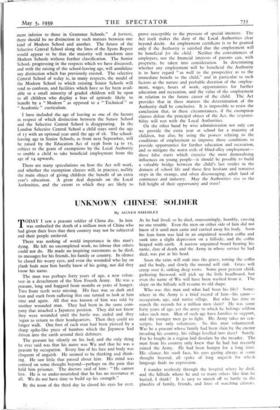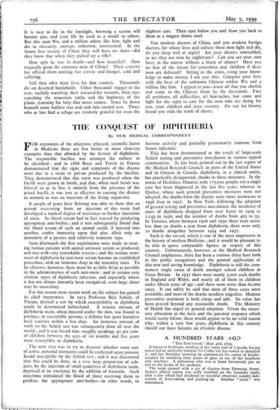UNKNOWN CHINESE SOLDIER
By AGNES SMEDLEY
TODAY I saw a peasant soldier of China die. In him was embodied the death of a million men of China who had given their lives that their country may not be subjected and their people enslaved.
There was nothing of world importance in this man's dying. He left no uncompleted work, no labour that others could not do. He made no inspiring statements as he died, no messages for his friends, his family or country. In silence he closed his weary eyes, and even the wounded who lay on plank beds near him hardly knew of his going, nor did they know his name.
The man was perhaps forty years of age, a new volun- teer in a detachment of the New Fourth Army. He was a peasant, long and haggard from months or years of hunger. Two front teeth were missing. His face was so dark and lean and stark from suffering that one turned to look at him time and again. All that was known of him was told by another wounded man. They had been in the same com- pany that attacked a Japanese position. They did not know they were wounded until the battle was ended and they iegan to return to their headquarters. Then they could no longer walk. One foot of each man had been pierced by a sharp spike-like piece of bamboo which the Japanese had driven into the earth around their defences.
The peasant lay silently on his bed, and the only thing he ever said was that his name was Wu and that he was a peasant by occupation. Every line of his face and body was eloquent of anguish. He seemed to be thinking and think- ing. He saw little that passed about him. His mind was centred on some thought beyond—perhaps on the pain that held him prisoner. The doctors said of him: " He cannot live. He is so under-nourished that he has no resistance at all. We do not have time to build up his strength."
By the noon of the third day he closed his eyes for ever. As he had lived, so he died, unassumingly, humbly, causing no one trouble. Even the men on either side of him did not know of it until men came and carried away his body. Soon his lean form was laid in an unpainted wooden coffin and sunk into a slight depression on a hillside, and the coffin heaped with earth. A narrow unpainted board bearing his name, date of death and the Army in whose service he had died, was put at his head.
Soon the rains will soak into the grave, rotting the coffin and the body, and slowly the mound will sink. Grass will creep over it, sinking deep roots. Some poor peasant child, gathering firewood, will pick up the little headboard, but even the name of Wu will have been washed from it. The slope on the hillside will resume its old shape.
Who was this man and what had been his life? Some- where in the Army is a brief record of him—his name— occupation, age, and native village. But who has time to search the records for a million men slain? He was some forty years of age, yet the army to which he belongs seldom takes such men. Men of such age have families to support, and the younger men go to fight. His Army takes no ccn- scripts, but only volunteers. So this man volunteered. Was he a peasant whose family had been slain by the enemy invading his country, his village levelled into dust? Surely. For he fought in a region laid desolate by the invader. The man from his country only knew that he had but recently joined the Army. He had been hungry for a long time. His silence, his stark face, his eyes gazing always at some thought beyond, all spoke of long anguish for which language finds no expression.
I wander restlessly through the hospital where he died, and the hillside where he and so many others like him lie buried, I think! It is easy to march off to battle to the plaudits of family, friends, and lines of watching citizens. It is easy to die in the limelight, knowing a nation will honour you, and 3our life be used as a model to others. But this man Wu, and a million others like him, fight and die in obscurity, unwept, unknown, unmourned. In the future free society of China they will have no share—did they know that when they picked up a rifle?
How ugly he was in death—and how beautiful! How tragically great the common men of China 1 Their country has offered them nothing but sorrow and hunger, cold and suffering.
Still they offer their lives for that country. Thousands die on deserted battlefields. Other thousands stagger to the rear, ruefully watching their uncared-for wounds, their eyes searching the mountain paths and the highways of the plains, yearning for help that never comes. Some lie down beneath some leafless tree and sink into eternal rest. Those who at last find a refuge are tenderly grateful for even the slightest care. Their eyes follow you and draw you back to them as a magnet draws steel.
You modern doctors of China, and you modern foreign doctors, for whose lives and culture these men fight and die, do you sleep well at night? Are your dreams untroubled, or are they not torn by nightmare? Can you see your own faces in the mirror without a blush of shame? Have you no fear of the future for yourselves and children if these men are defeated? Sitting in the cities, using your know- ledge to make money, I ask you this : Compare your lives with the lives of the unknown Chinese soldier Wu and a million like him. I appeal to you—leave all that you cherish and come to the Chinese front by the thousands. Face all problems, all difficulties, all heartaches, but come and fight for the nght to care for the men who are dying for you, your children and your country. Do not ley history brand you with the mark of shame.















































 Previous page
Previous page